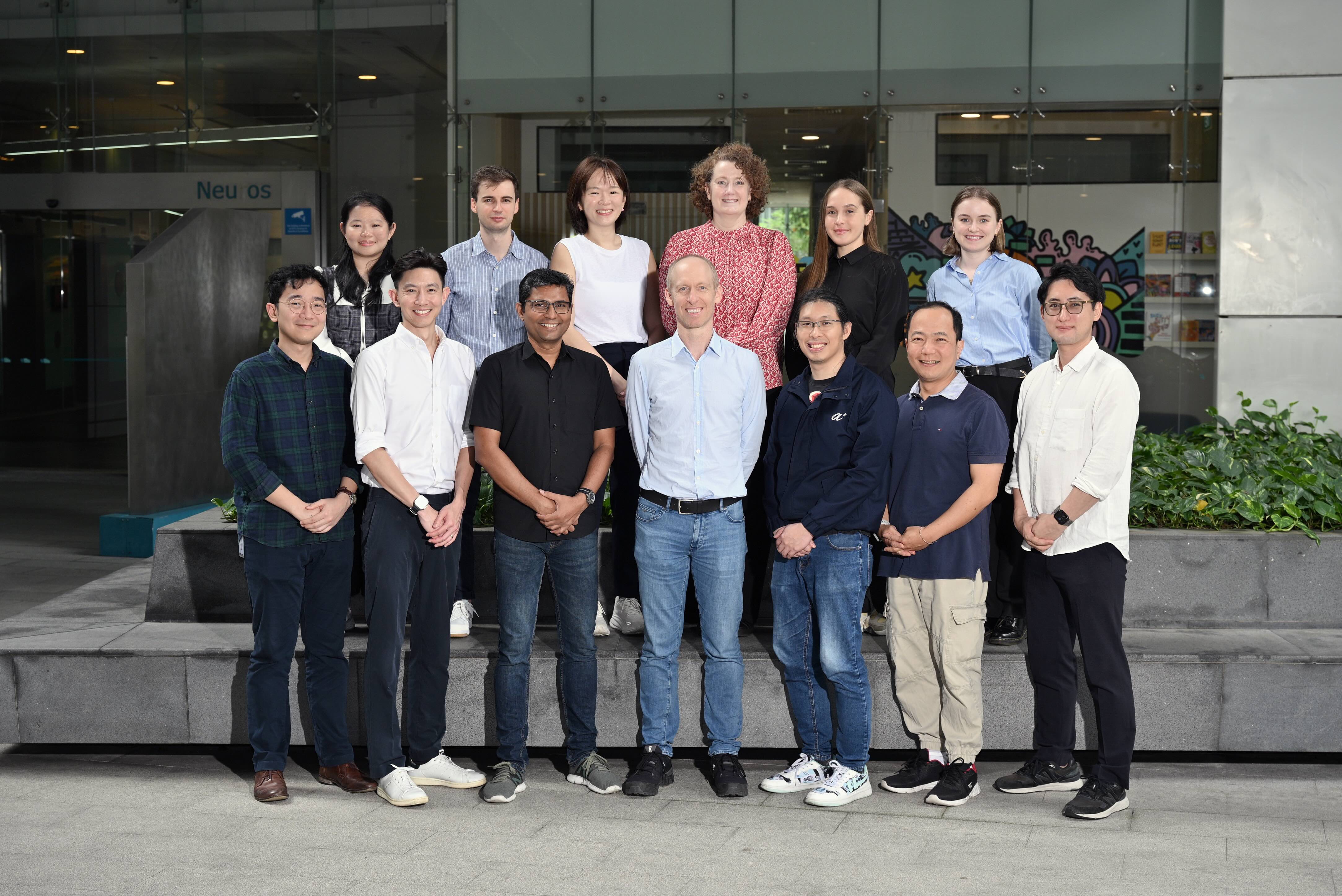John Common

Dr John Common
Senior Principal Investigator
Joint Appointee - A*SRL and Newcastle University
Email: john_common@asrl.a-star.edu.sg
Research themes: Inflammation & immunology, Skin Barrier, Skin Genetics
Biography
Dr John Common is a Principal Investigator at A*STAR, Skin Research Labs and previously held the same position at A*STAR, Institute of Medical Biology. John’s laboratory focuses on studying skin biology, the mechanisms of skin barrier function and inflammatory skin diseases, including atopic dermatitis and alopecia areata.
In the area of skin barrier and immunopathogenesis, John together with Steven Thng has set up the National Atopic Dermatitis Program to catalyse the promote research into atopic dermatitis. John’s lab plays an instrumental role in anchoring the main theme studying molecular mechanisms, identifying novel biomarkers and immunopathology of atopic dermatitis. In addition to this the lab also investigate host-microbiome and host-environmental interactions to better understand the beneficial or detrimental roles of microbes and environmental stimuli via the skin. By investigating molecular mechanisms of skin health and disease we will break new ground in the understanding of skin biology, specifically in the area of how environment/microbiomes interact with the skin and influences the immune system.
John obtained his PhD from the Centre for Cutaneous Research, Queen Mary University of London in 2004. His thesis on characterizing the genetic and functional analysis of epidermal connexins was carried out under the supervision of Professor David Kelsell. During this time, John identified several connexin mutations associated with human skin disorders including novel mutations in GJB4. While in London, he also identified the first recessive mutation in desmoplakin that results in skin disease with cardiomyopathy. John moved to Singapore in 2005 for his Postdoctoral training with Birgit Lane, working on disease mechanisms of keratin disorders. In Birgit’s lab working closely with clinical collaborators, they established a genetics programme to study rare disorders of the skin and also more common diseases such as acne vulgaris and atopic dermatitis.
Our primary research interest is to study genes and pathways that regulate the formation of the epidermal barrier and what goes wrong in disease. The genetic basis of human skin diseases is of great interest to scientists and clinicians alike. In the lab we have a number of projects geared towards understanding the mechanisms of both rare and common human epithelial disorders such as atopic dermatitis, ichthyosis, epidermolysis bullosa and alopecia areata. By studying patient DNA and tissue we hope to dissect mechanistic pathways important for skin function and how targeting these pathways could be important for the development of new therapeutic treatments. Working with clinical samples we have identified a spectrum of filaggrin gene mutations that are associated with ichthyosis vulgaris and atopic dermatitis in Singaporean ethnicities. Filaggrin is a central node in skin barrier formation with multiple functions during epidermal terminal differentiation and the formation of an effective skin barrier. To investigate the filaggrin pathway and particularly the mutations identified in Singapore we work with reconstituted skin models to study mechanisms of skin barrier formation and barrier disruption during disease. We are also studying the microbiome of skin with particular emphasis on skin barrier diseases and subclinical phenotypes such as dry skin. We are focused on detailed analysis of how host genetics and the functional skin microbiome can impact the epidermal barrier in health and disease. We now know that genetic and immune dysregulation of the epidermal barrier can result in dry skin and/or inflammatory skin disorders, such as atopic dermatitis. However, little is understood about how microbes interact with the host or how the host responds to resident microbes to influence health and disease. With constant host-microbe crosstalk at the epidermal barrier we hypothesize that the skin microenvironment plays a major role in immune tolerance and conversely contributes to inflammatory diseases and ageing. To gain detailed insight into the regulatory network of host-microbe interaction we work with both human subjects and lab techniques to investigate functional pathways. Deciphering mechanistic relationship between skin barrier, immune system and skin microbiome, will reveal novel insights into healthy and diseased skin and provide new targets to improve health outcomes as we transition from observations to therapeutics.

Common's Lab
Team
Front Row (Left
to Right): Lim Ying
Shiang, Zachary Chow Jing Shen, Viduthalai Rasheedkhan Regina, John Common,
Colin Cornelius, Lim Seong Soo, Hanakawa Sho
Back Row (Left
to Right): Yap Lin
Hwee, Stephen Wearne, Ong Ruo Yan, Cindy Coffill, Beatrice Varanauskaite, Grace
South
Tay A.S.L*, Li, C. *, Nandi, T.*, Chng, K.R., Andiappan, A.K., Mettu, V.S., de Cevins, C., Dutertre, C.A. Wong, X.F.C.C., Ng, A.H.Q. Matta, S.A., Ginhoux, F., Rötzschke, O., Chew, F.T. Tang, M.B.Y., Yew, Y.W., Nagarajan, N.,# Common, J.E.A#. Skin microbiome dermotypes in atopic dermatitis are linked to host immunity and microbial virulence. J Allergy Clin Immunol. 2021 Apr 1;147(4):1329-40. doi: 10.1016/j.jaci.2020.09.031. PMID: 33039480
Nakajima S*, Nomura T*, Common J#, Kabashima K#. Insights into atopic dermatitis gained from genetically defined mouse models. J Allergy Clin Immunol. 2019 Jan;143(1):13-25. doi: 10.1016/j.jaci.2018.11.014. PMID: 30612664.
Wong XFCC*, Denil SLIJ*, Foo JN, Chen H, Tay ASL, Haines RL, Tang MBY, McLean WHI, Sandilands A, Smith FJD, Lane EB, Liu J, Common JEA. Array-based sequencing of filaggrin gene for comprehensive detection of disease-associated variants. J Allergy Clin Immunol. 2018 Feb;141(2):814-816. doi: 10.1016/j.jaci.2017.10.001. Epub 2017 Oct 19. PMID: 29056476; PMCID: PMC5792052.
Kong HH, Andersson B, Clavel T, Common JE, Jackson SA, Olson ND, Segre JA, Traidl-Hoffmann C. Performing Skin Microbiome Research: A Method to the Madness. J Invest Dermatol. 2017 Mar;137(3):561-568. doi: 10.1016/j.jid.2016.10.033. Epub 2017 Jan 4. PMID: 28063650; PMCID: PMC5468751.
Chng KR, Tay AS, Li C, Ng AH, Wang J, Suri BK, Matta SA, McGovern N, Janela B, Wong XF, Sio YY, Au BV, Wilm A, De Sessions PF, Lim TC, Tang MB, Ginhoux F, Connolly JE, Lane EB, Chew FT, Common JE#, Nagarajan N#. Whole metagenome profiling reveals skin microbiome-dependent susceptibility to atopic dermatitis flare. Nat Microbiol. 2016 Jul 11;1(9):16106. doi: 10.1038/nmicrobiol.2016.106. PMID: 27562258.
Sundaram GM*, Common JE*, Gopal FE, Srikanta S, Lakshman K, Lunny DP, Lim TC, Tanavde V, Lane EB, Sampath P. 'See-saw' expression of microRNA-198 and FSTL1 from a single transcript in wound healing. Nature. 2013 Mar 7;495(7439):103-6. doi: 10.1038/nature11890. Epub 2013 Feb 10. PMID: 23395958.
Google Scholar
ORCID
A*STAR Open Access Repository
A*STAR celebrates International Women's Day

From groundbreaking discoveries to cutting-edge research, our researchers are empowering the next generation of female science, technology, engineering and mathematics (STEM) leaders.
Get inspired by our #WomeninSTEM
